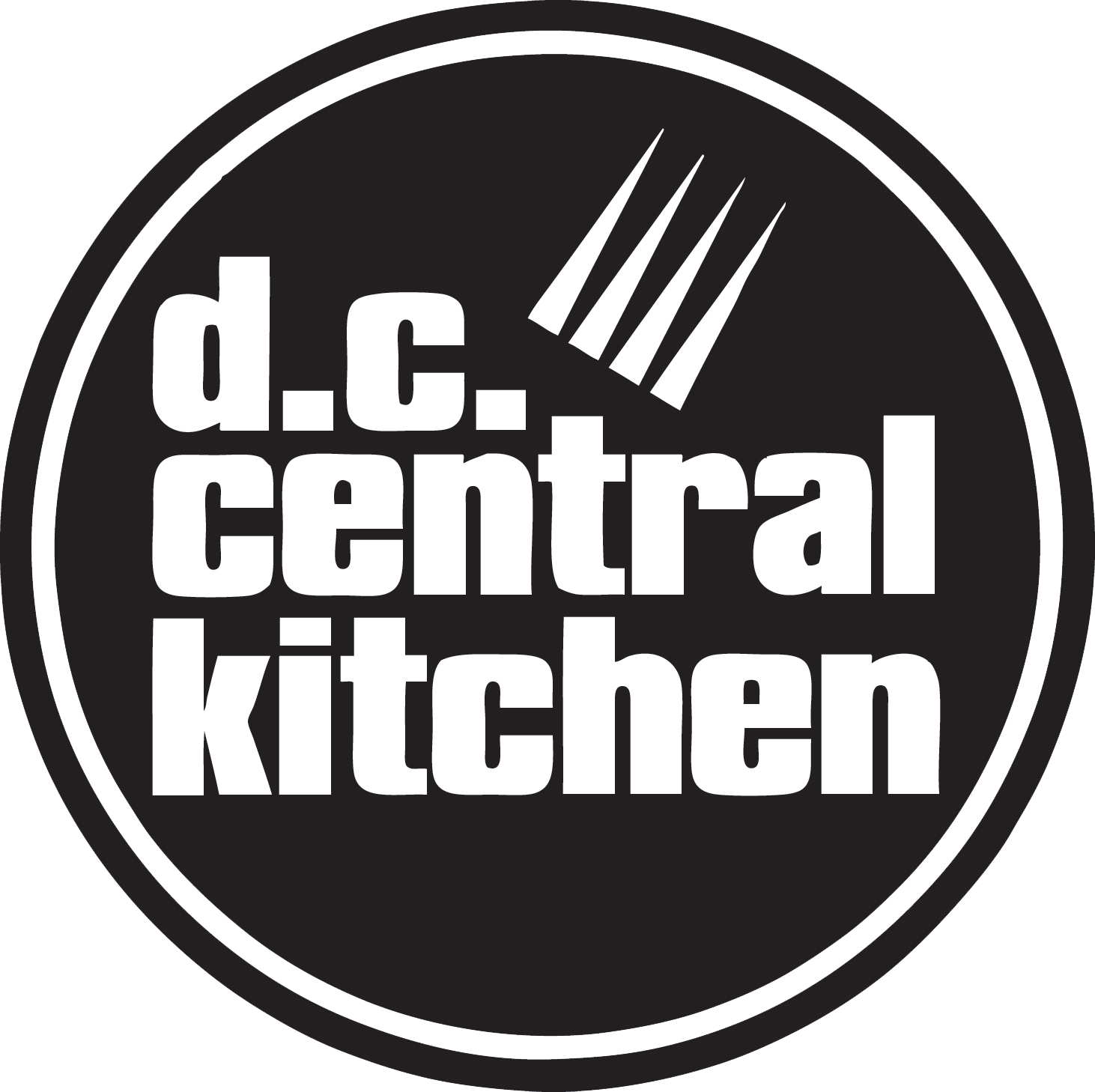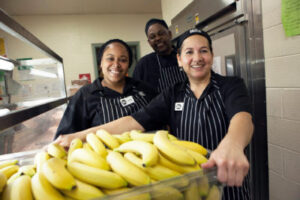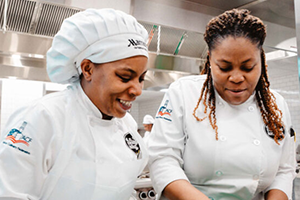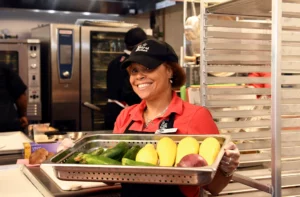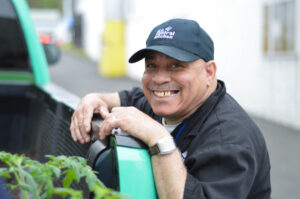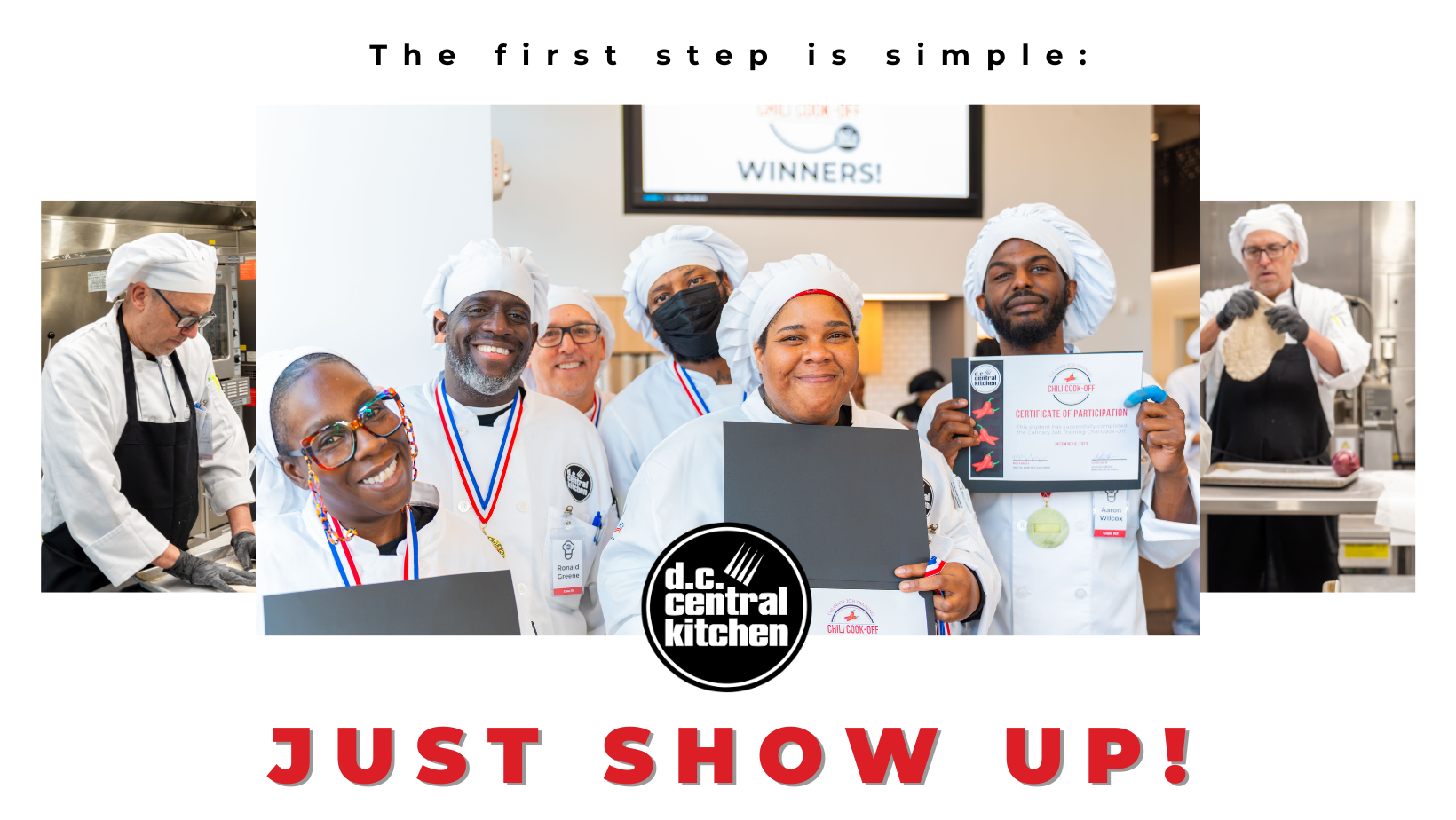Darrin is pictured on the right, left, and with his cook-off team in the images above
This is a first-person account from Darrin M., a member of DC Central Kitchen’s Culinary Job Training program’s 161st Class. Darrin interned with the DCCK Communications Team last month. He and his classmates will complete the program later this month. Please join us February 2, 2024 at the MLK Public Library to celebrate their accomplishments during our next Graduation ceremony.
When I first started the Culinary Job Training program at DC Central Kitchen, I couldn’t imagine that learning to cook might require tears. But after ten weeks of classes and internships and plenty of practice in the kitchen, and as our cohort prepares for externships and graduation and new careers, I now understand that a few tears were among the powerful personal ingredients we each contributed to complete the recipe of the program. Whether our tears were of frustration or fear, sadness or success, we transformed ourselves and pushed each other along a journey that is about far more than just food.
The learning curve was steep. On my first morning in class, facilitator Jeffery Rustin warned our two-dozen-strong Class #161 that no matter where we came from or where we hoped to go, we’d first have to learn new “life skills” before we learned the “knife skills” required on the job. I must have rolled my eyes at the rhyme because Rustin picked me out of all the new faces and asked me to describe the struggle that brought me to the program our chef-instructor lovingly nicknamed “The House of Second Chances.”
Put on the spot, I stammered at first, not knowing how deep to go or how much of my story to reveal. An Army veteran and a former journalist who had covered war for years, I am practiced in keeping my feelings close, rarely giving anything personal, especially to strangers, and especially if it meant disclosing failure of fear. I’m also not used to asking for help, usually saying “I’ve got this,” even when I don’t.
But this time was different. Already, just sitting there in the classroom at the Klein Center meant that I had reached out and asked for help, and that DC Central Kitchen was offering me a chance if I would just ‘trust the process’ – another of Rustin’s lines I have come to respect. So, in a spirit of free-falling faith, I cleared my throat and named aloud some of the things that had for so long held me back, including depression, isolation, addiction, and shame.
“Great!” Rustin said. He saw my discomfort and pressed me for more. “So how are you going to overcome those obstacles?” he asked. “What are you going to do differently? How can you start?” The room was silent as my new classmates hung on my answer. I could feel their eyes prying it out.
“Just show up,” I said with unexpected honesty and a slightly trembling voice. My simple answer surprised me. It felt like my hard shell was starting to crack.
“Just show up…for work,” I continued through a slight sob, thinking of how long it had been since I had worked and how terrible that made me feel about myself.
“Just show up…for my family,” I said, feeling the weight of shame for failing to contribute my full potential, for getting stuck, for having offered my son no real model to be proud of in years. I yearned for that to change.
Then, as I watched Rustin’s face light up, I felt a sudden connection with everyone around me. I sat up straight and spoke clear as if I had known this answer all along.
“Just show up for life,” I said.
Rustin, who is also a pastor, jumped on my answer and shouted, “Just show up!” He then pointed in turn to another student and said, “What are you going to do?” In a call-and-response that traveled around the room, each student called out loud like it was a Sunday in church. “Just show up.”
Many of my peers, they would reveal over many similar sessions in the days and weeks to follow, had previously been incarcerated, addicted, homeless, abused, or unemployed for long periods of time. Some shared stories of poverty, violence, hopelessness, and even attempts at suicide. We all had stories and shared common deep fears and doubts about completing the program, about starting a new career or even deserving one, about the possibility of changing our lives. For some, like me, the Culinary Job Training Program seemed like one last chance.
Just show up. While it seemed like a simple throwaway line at the time, just showing up really was the first step to overcoming the obstacles that kept us from being our best selves and living our best lives. Showing up is intentional, purposeful, and assertive. It breaks through the stuck spot. It is what I can do right here and right now.
For the past ten weeks – whatever we had faced before, however, we thought about ourselves or how we looked to others – we have had to show up every morning on time, which meant leaving in the dark each morning and returning home after dark that night. We had to show up and look proud in full uniform. We had to show up with homework completed, our phones locked away, and our minds opened to learn. Above all, we showed up each morning willing to share our stories – facing ourselves in front of our new family and describing how we were and how we dreamed of being. We showed up willing to try something we had never done before. Just showing up made all the rest possible.
Along with training and certification in food safety and kitchen competence, in addition to learning how to combine a delicate Hollandaise or present our best chili in the traditional class cookoff, we trained to build good habits and drop bad ones. We learned to create personal discipline and become accountable to ourselves and others. We learned about commitment, consistency, confidence, compassion, and character. We learned to identify the next right thing and do it.
When I walked the halls of the brightly lit and bustling Klein Center this morning, I spotted my classmates spread throughout the building by their bright white chef’s jackets and puffy white hats, all working the third and final week of internal internships called “tracks” before we are placed in community externships and apply to jobs. Some of my peers had already dispatched out into the community – delivering food to schools or corner stores, working at Marianne’s cafe at the MLK Library or the DCCK Cafe at THEARC in Ward 8. Most were busy on the Klein Center floor. I spotted my classmate Jeffery working a gig in Facilities Management, proudly pushing a broom, while nearby, Ronald polished the student kitchen’s glass. Jazmine and Donna instructed a prep kitchen full of fresh volunteers on how to safely chop greens and other veggies for Healthy Corners and Healthy School Food. “May I offer you something, sir,” Amy asked from behind the counter of the Klein Center’s cafe. Aaron and Donte, Deangelo and Mikhal leaned into their assignments in the massive production kitchen, their skills and confidence on full display among the professional cooks. I was headed for an orientation of the Newmark Media Studio for Zealous Communications tucked in a corner just off the lobby. Fears of the future or preoccupation with the past are no longer top-of-mind. Instead, we’re applying ourselves to a task – right here, right now. Even with graduation a month away, some have already been offered jobs.
While it hasn’t been an easy journey, this opportunity at DC Central Kitchen was a balance of work and fun. Our first-day feelings of shame and fear seem distant now, replaced along the way with laughter and confident smiles. Our class full of strangers has grown into a family of colleagues and friends. What once felt like insurmountable obstacles and stories impossible to redeem are now just goals to achieve and experiences that make us who we are. Every day is another opportunity to show up for what’s most important and to focus on another one of Rustin’s clever sayings: “Always finish strong.”

